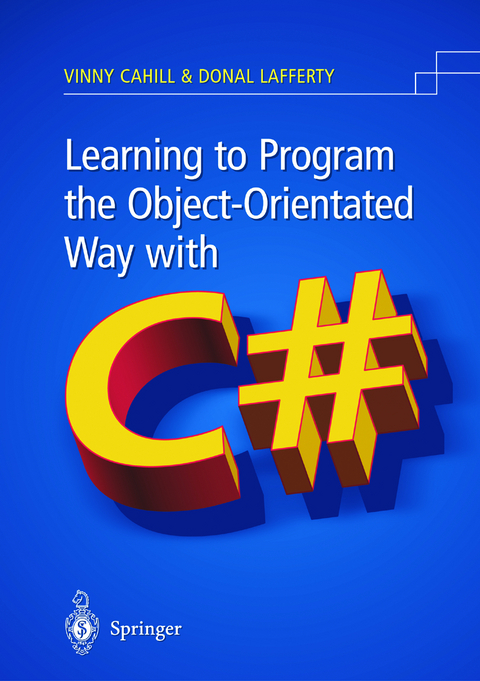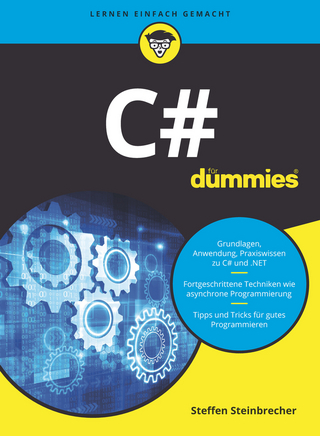
Learning to Program the Object-oriented Way with C#
Springer London Ltd (Verlag)
978-1-85233-602-8 (ISBN)
C# is a modern, object-oriented language that enables programmers to quickly build a wide range of applications for the new Microsoft .NET platform, which provides tools and services that fully exploit both computing and communications. Learning to Program the Object-Oriented Way with C# presents an introductory guide to this hot topic. The authors use a practice-based approach supported by lots of examples of increasing complexity and frequent graded exercises, which are available online. -Introduces an approach to learning programming based on the use of object orientation from day one. -Includes many worked examples, the code and solution to which are available online. -The book is being technically reviewed and approved by Microsoft. -One of the first introductory textbooks on C# and object orientation - based on the final release version at the beginning of 2002. -Suitable for courses in introductory programming.
1 Objects and Classes.- Introducing Object-oriented Programming.- Writing a C# Class.- Writing a Program that Uses Class Rectangle.- Summary.- Exercises.- 2 Computers, Programming Languages, and C#.- The Components of a Typical Computer.- Programming Languages.- Operating Systems and Portability.- C#.- Developing programs with VisualStudio.NET.- Making Changes to a Class.- Summary.- 3 Variables, Types, and Assignment.- Storing Information -Variables.- Describing Information -Types.- Working with Real Numbers -Type float.- Working with Real Numbers -Type decimal.- Conversions Between Numeric Types.- Changing the Value of a Variable -Assignment.- All About Nothing -null.- Calculating New Values -Expressions.- Class string.- Initializing New Objects -Constructors.- Giving Names to Values -Constants.- Case Study: The Traveling Salesperson.- Summary.- Exercises.- 4 Making Decisions - Selection in C#.- Describing Conditions -Type bool.- Comparing Numeric Values.- Comparing bool Values.- Comparing Objects.- Comparing Object References.- Nested if Statements.- Using if to Select One of Many Alternative Courses of Action.- Defensive Programming.- Using an if Statement Without else.- More About & and | |.- The C# switch Statement.- Summary.- Exercises.- 5 Doing Things Repeatedly — Iteration in C#.- Repeating a Sequence of Statements -The while Statement.- Combining Iteration and Selection.- Generating Functions.- Repeating a Sequence of Statements One or More Times -do.- Case Study: The Traveling Salesperson Revisited.- Summary.- Exercises.- 6 More About Methods.- Referring to the Current Object.- Methods Without Values -void.- Passing Parameters to Methods.- Class Variables and Methods.- The Scope Rules of C#.- Overloading Methods.- Object Deletion and Destructors.- CaseStudy: Complex Numbers.- Summary.- Exercises.- 7 Abstraction and Encapsulation.- Abstraction.- Encapsulation.- Access Modifiers.- Properties.- Defining Operators for Objects.- Case Study: Complex Numbers Revisited.- Summary.- Exercises.- 8 More About Types and Values.- Value Types vs. Reference Types.- Defining Value Types -structs.- Passing Parameters by Reference.- Case Study: Intersecting Line Segments.- Summary.- Exercises.- 9 Characters, Strings and Things.- Working with Characters -Type char.- All About Strings.- Class StringBuilder.- Case Study: Roman Numerals.- Summary.- Exercises.- 10 Managing Collections of Data -Arrays in C#.- Arrays -The Basics.- The for Loop.- The Autoincrement and Autodecrement Operators.- Array Overflow.- The foreach Loop.- Managing Tables -Two-dimensional Arrays.- Indexers -Accessing Arbitrary Objects by Index.- Command Line Arguments.- Case Study: Managing a Lecture Timetable.- Summary.- Exercises.- 11 Inheritance.- Two Key Relationships: “Has-A” and “Is-A”.- Demonstrating “Is-A” and “Has-A”.- Problems with Implementing “Is-A” Relationships.- Introducing Inheritance.- Effects of Access Modifiers on Inheritance.- Implications of Inheritance on Type.- Changing Existing Methods in a Derived Class.- Interfaces.- Structs, Inheritance and Boxing.- Case Study.- Summary.- Exercises.- 12 Error Handling.- Understanding Stacks.- Dealing with Errors.- Throwing Exceptions.- C# Defined Exceptions.- Case Study.- Summary.- Exercises.- 13 GUI Development.- GUI Design.- Understanding Events.- Operating the GUI.- Case Study.- Summary.- Exercises.- 14 Case Study-Putting It All Together.- A Library Database Management System.- Identifying the Classes.- The Classes in Detail.- User Interface: Designing Our GUI.- Summary.- Exercises.- AIntroducing the Internet and the World Wide Web.- B Case Study Source Code.
| Erscheint lt. Verlag | 26.7.2002 |
|---|---|
| Zusatzinfo | 263 Illustrations, black and white; XIV, 626 p. 263 illus. |
| Verlagsort | England |
| Sprache | englisch |
| Maße | 170 x 244 mm |
| Themenwelt | Informatik ► Programmiersprachen / -werkzeuge ► C# |
| Informatik ► Theorie / Studium ► Compilerbau | |
| ISBN-10 | 1-85233-602-1 / 1852336021 |
| ISBN-13 | 978-1-85233-602-8 / 9781852336028 |
| Zustand | Neuware |
| Haben Sie eine Frage zum Produkt? |
aus dem Bereich


